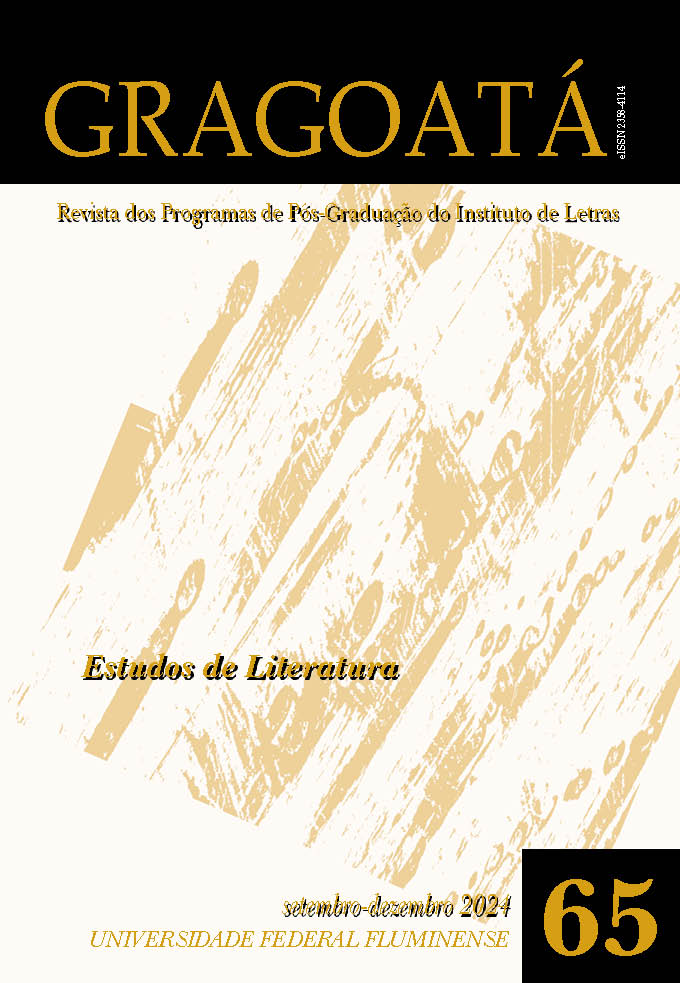Speak about Oneself: Between Aesthetics and Ethics in Michel Foucault
DOI:
https://doi.org/10.22409/gragoata.v29i65.61873.ptKeywords:
Michel Foucault, Literature, SubjectivityAbstract
This paper intends to analyze the possible relations between writing, literature and the Self throughout the works of Michel Foucault. To do so, we begin with a commentary on Maurice Blanchot’s “The daily journal and the narrative”, from The Book to Come, that provides the paradigm according to which Foucault understands these relations in the 1960s. The French philosopher inherits from Blanchot a conception of literature as an instance where the Self disappears. This paradigm will change when, turning to his genealogic phase during the 1970s, Foucault will conceive all literature as linked to the exercise of power: no longer able to unearth a potency that negates all sovereignty, literature becomes another discourse that fabricates a governable and docile interiority by forcing a subject to talk about himself. Finally, in the 1980s, Foucault returns to an affirmative consideration of literature and art. In line with the privilege of ethics – evident in this phase of his work –, this return to aesthetics will be marked by an understanding of art that innovatively considers it less a form of creating works than a place to invent oneself.
Downloads
References
BLANCHOT, Maurice. O livro por vir. Tradução de Leyla Perrone-Moisés. 1a ed. São Paulo: WMF Martins Fontes, 2005.
BLANCHOT, Maurice. A literatura e o direito à morte. In: BLANCHOT, Maurice. A parte do fogo. Tradução de Ana Maria Scherer. Rio de Janeiro: Rocco, 1997. p. 289-330
DETIENNE, Marcel. Mestres da verdade na Grécia Arcaica. Tradução de Andréa Daher. Prefácio de Pierre-Vidal Naquet. Rio de Janeiro: Jorge Zahar, 1988.
FOUCAULT, Michel. A coragem da verdade: Curso dado no Collège de France (1983-1984). Edição de Fréderic Gros. Tradução de Eduardo Brandão. São Paulo: Martins Fontes, 2017.
FOUCAULT, Michel. A Hermenêutica do Sujeito: Curso dado no Collège de France (1981-1982). Edição de Fréderic Gros. Tradução de Márcio Alves da Fonseca e Salma Tannus Muchail. São Paulo: Martins Fontes, 2006a.
FOUCAULT, Michel. A história da loucura: na Idade Clássica. Tradução de José Teixeira Coelho Neto. 9. ed. São Paulo: Perspectiva, 2010.
FOUCAULT, Michel. A história da sexualidade, Vol 1 – A vontade de saber. Tradução de Maria Thereza da Costa Albuquerque e J. A. Guilhon Albuquerque. 9. ed. Rio de Janeiro; São Paulo: Paz e Terra, 2019.
FOUCAULT, Michel. Ditos & escritos I: Problematização do Sujeito: Psicologia, Psiquiatria e psicanálise. Organização de Manoel Barros da Motta. Tradução de Vera Lucia Avellar Ribeiro. Rio de Janeiro: Forense Universitária, 1999.
FOUCAULT, Michel. Ditos & escritos II: Arqueologia das ciências e história dos sistemas de pensamento. Organização de Manoel Barros da Motta. Tradução de Elisa Monteiro. Rio de Janeiro: Forense Universitária, 2000.
FOUCAULT, Michel. Ditos e escritos III: literatura e pintura, música e cinema. Tradução de Inês Autran Dourado Barbosa. 2. ed. Rio de Janeiro: Forense Universitária, 2009.
FOUCAULT, Michel. Ditos e escritos IV: Estratégia, poder-saber. IV. Tradução de Vera Lucia Avellar Ribeiro. 2. ed. Rio de Janeiro: Forense Universitária, 1998.
FOUCAULT, Michel. Ditos e escritos, V: Ética, Sexualidade e Política. Tradução de Elisa Monteiro, Inês Autran D. Barbosa. 2. ed. Rio de Janeiro: Forense Universitária, 2006b.
FOUCAULT, Michel. Vigiar e punir: Nascimento da prisão. Tradução de Raquel Ramalhete. 16. ed. Petrópolis: Vozes, 2020.
HOMERO. Odisseia. Tradução de Carlos Alberto Nunes. Rio de Janeiro: Ediouro, 2001.
LAERTIUS, Diogenes. Lives of Eminent Philosophers, Vol. II. Translation by R.D. Hicks. London: William Heinemann/New York: G.P. Putnam’s Sons, 1925.
MACHADO, Roberto. Foucault, a filosofia e a literatura. 3a ed. Rio de Janeiro: Jorge Zahar, 2005.
Downloads
Published
How to Cite
Issue
Section
License
Copyright (c) 2024 Gragoatá

This work is licensed under a Creative Commons Attribution 4.0 International License.
Authors who publish in Gragoatá agree to the following terms:
The authors retain the rights and give the journal the right to the first publication, simultaneously subject to a Creative Commons license CC-BY-NC 4.0, which allows sharing by third parties with due mention to the author and the first publication by Gragoatá.
Authors may enter into additional and separate contractual arrangements for the non-exclusive distribution of the published version of the work (for example, posting it in an institutional repository or publishing it in a book), with recognition of its initial publication in Gragoatá.

Gragoatá is licensed under a Creative Commons - Attribution-NonCommercial 4.0 International.











